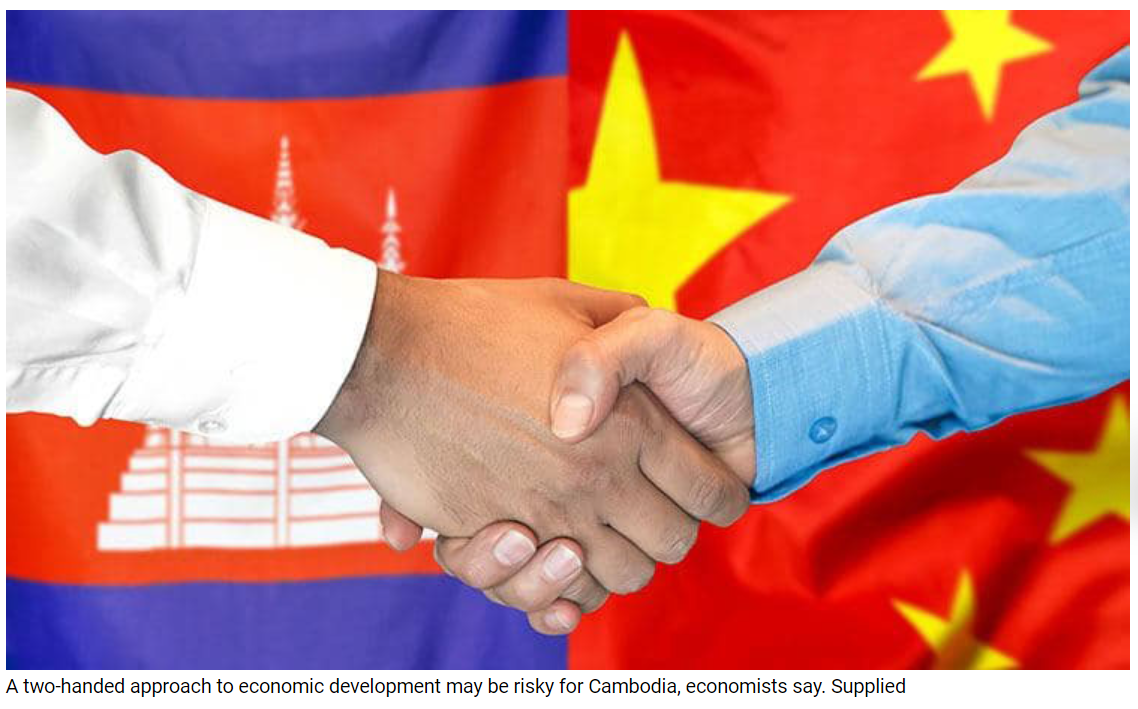Cambodia: ‘Kingdom shouldn’t over rely on Belt and Road Initiative’
Cambodia should look beyond China’s Belt and Road Initiative (BRI) for growth despite the commerce minister noting the country was receiving big benefits from it, economists say.
Speaking at the Policy Dialogue of the 6th Belt and Road Summit 2021, Pan Sorasak said the BRI contributes to infrastructure development which helps facilitate trade and competitiveness. He said that was good for growth, well-being and alleviating poverty in the Kingdom.
Sorasak also emphasised the importance of Cambodia’s free trade agreement with China and membership of the Regional Comprehensive Economic Partnership (RCEP), which includes China among its members. RCEP is expected to come into effect next year, creating the world’s biggest trading bloc.
However, economists say while China is an important market for Cambodian exporters and the biggest donor of foreign aid and infrastructure investment, the country needs to find more foreign buyers and lenders and forge more trade deals around the world. “Diversifying export markets and sources of foreign investment and borrowings is important to reduce vulnerability to country-specific or regional shocks and mitigate risks,” said Jayant Menon, visiting senior fellow at Singapore’s ISEAS Yusof Ishak Institute. “This played out during the Global Financial Crisis of 2008-9, when Cambodia’s growth fell to 0.1 percent because of its heavy reliance on the US market then. It was the worst-affected country in the Mekong region,” he said. “Today its trade and investment links are even higher with China. This level of reliance is unhealthy and risky, as recent history has clearly demonstrated, and finding new markets and investors will reduce dependence and increase resilience going forward.”
Chinese foreign direct investment (FDI) accounted for 60 percent of FDI-funded projects in Cambodia in 2017, according to the World Bank. In 2019 it says Chinese FDI made up 43 percent of a record $3.65 billion of investment in the Kingdom.
Cambodia may not have much luck attracting more investment from the US, according to the US State Department.
“Apart from the country’s relatively small market size, there are other factors dissuading US investors: corruption, a limited supply of skilled labour, inadequate infrastructure (including high energy costs) and a lack of transparency in some government approval processes. Failure to consult the business community on new economic policies and regulations has also created difficulties for domestic and foreign investors alike,” it said in its 2020 Investment Climate Statements.
Other economists say Cambodia should look less to exports and investment from overseas and build up its domestic market.
“It is extremely important for countries like Cambodia to revisit their industrial and trade policies in order to have short-term and long-term plans for building resilience of the economy against future external shocks,” said Rashmi Banga, senior economic affairs officer in the Unit on Economic Cooperation and Integration among Developing Countries at the United Nations Conference on Trade and Development (UNCTAD).
“Dependency on a few sectors for growth, particularly export-oriented sectors, may be dangerous for sustainable growth,” she added. “Export diversification is necessary and new streams of employment need to be developed, especially as the global economy is shifting towards digital technology and robotics. Developing digital designing and data-processing skills in the younger population can help in opening new avenues of employment.”
To this end Cambodia has just broken ground on a new National Incubation Center in Phnom Penh to mentor young tech entrepreneurs.
The government launched its new tech plan, the “Digital Economy and Social Policy Framework of Cambodia 2021-2035” in June, saying information technology offers a new model of economic growth.The new plan aims to address the needs and potential of both public and private sectors and take full advantage of the economic resources available to the Kingdom, while continuing on the path of rapid growth Cambodia has achieved over the past 30 years.
Source: https://www.khmertimeskh.com/50930587/kingdom-shouldnt-over-rely-on-belt-and-road-initiative/


 English
English




